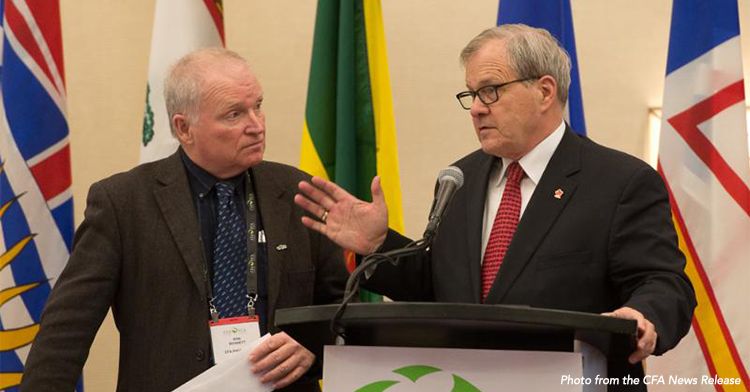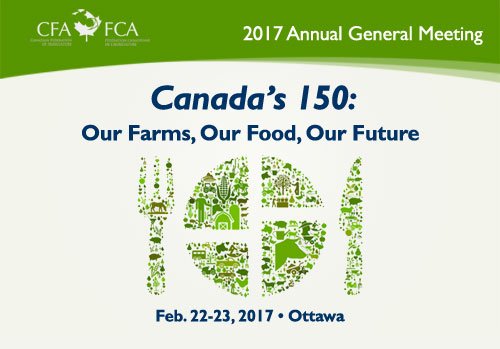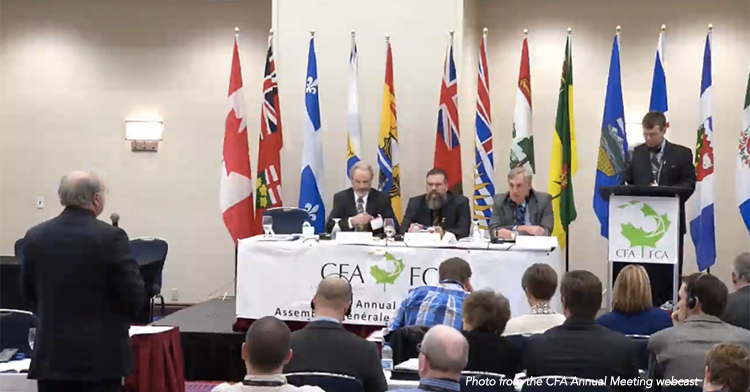Field Notes from the Canadian Federation of Agriculture’s 2017 Annual General Meeting

Photo - CFA President Ron Bonnett and Agriculture and Agri-Food Minister Lawrence MacAulay discuss Canadian agriculture policy at CFA Annual Meeting in Ottawa.
Discussing the many problems that stem from our current food system often puts agriculture in opposition to environmental sustainability. This is an oversimplification as Canadian agriculture is, and has been for some time, having a meaningful conversation about environmental sustainability.
 For example the recent Canadian Agriculture Day event in Ottawa on February 16th, Sygenta Canada spoke of their Good Growth Plan, while McDonald's Canada highlighted their Beef Sustainability Program. While there is likely disagreement on the scope and depth of these proposals, and much work remains to hold these actors to their commitments, it is important to recognize that these discussions are taking place in agricultural circles.
For example the recent Canadian Agriculture Day event in Ottawa on February 16th, Sygenta Canada spoke of their Good Growth Plan, while McDonald's Canada highlighted their Beef Sustainability Program. While there is likely disagreement on the scope and depth of these proposals, and much work remains to hold these actors to their commitments, it is important to recognize that these discussions are taking place in agricultural circles.
The sustainability agenda was well reflected at the Canadian Federation of Agriculture’s Annual General Meeting February 22 - 23 in Ottawa, as many of the speakers spoke to the importance of reducing resource use and implementing more sustainable farming practices. Economic growth and telling the story of Canadian agriculture were also key themes that emerged.
Minister of Agriculture and Agri-Food Lawrence MacCauley's keynote address emphasized the importance of sustainable, innovation and international trade to the future of agriculture. These themes were echoed by Dominic Barton, recapping the key points of the Advisory Council's recent report on 'Unleashing the Growth Potential' of Agriculture. (See Food Secure Canada's recent blog post analyzing their recommendations).
Mike Hoffort, from Farm Credit Canada, gave an overview of the state of Canadian agriculture and outlined FCC's vision for its future. He emphasized that while farm debt is growing (nearing $100 Billion in 2016), the sector remains financial robust and stable due to increasing farm receipts and farm outcomes.
It's here that I think we need to be a little bit careful about the rosy picture we present. Yes, overall farm receipts and incomes are rising, but which farms and which farmers are seeing these increases? Many small farms across Canada are struggling, and when you take out off-farm incomes and government programs, farm incomes seem much less robust.
Similarly, there was much talk of increasing productivity and growth; but we need to ask, what kind of growth and at what cost? What are the environmental and social costs of farm consolidation, and what effect does increasing the bushel per acre ratio (a traditional benchmark of productivity) have on soil health and biodiversity? What is the right balance to strike between growth in exports and fostering strong domestic markets and nourishing our neighbours and communities?
Civil society has an important role to play in discussing these many questions with farmers so we can generate solutions together. For example, food banks in Canada first emerged in the 1980s, around the same time that farmers were losing their farms due to unprecedented interest rate hikes. What can we learn from how these two moments in our food system’s history are connected and what can these insights bring into our discussions of how to build a sustainable and prosperous food system for all Canadians?

One thing is for certain, there are growing numbers of young people keen to dig in and contribute to Canada’s agricultural industry. Many new farmers were in attendance raising great questions and proposing solutions, leaving me optimistic about the future of a more healthy, just, sustainable food system in Canada.
Most notably in their meeting the CFA passed a resolution to work with other key stakeholders on a National Food Policy, with near unanimous approval. All of the speakers at the AGM spoke to the opportunity to share the “positive story” of Canadian agriculture with the world. Canada's agriculture definitely has many reasons to be proud, but that should not prevent us from asking important questions about how we can do better, and how we can bring increased equity to its growth, and build up the social and environmental sustainability of the sector alongside economic stability. We are excited to bring our civil society voice to join the national food and agriculture policy-making table.
Amanda Wilson works with Food Secure Canada coordinating their work on New Farmers, Northern Food and Community-Academic Collaboration. She is a post-doc fellow at Lakehead University and can be reached at community@foodsecurecanada.org.
- Log in to post comments

